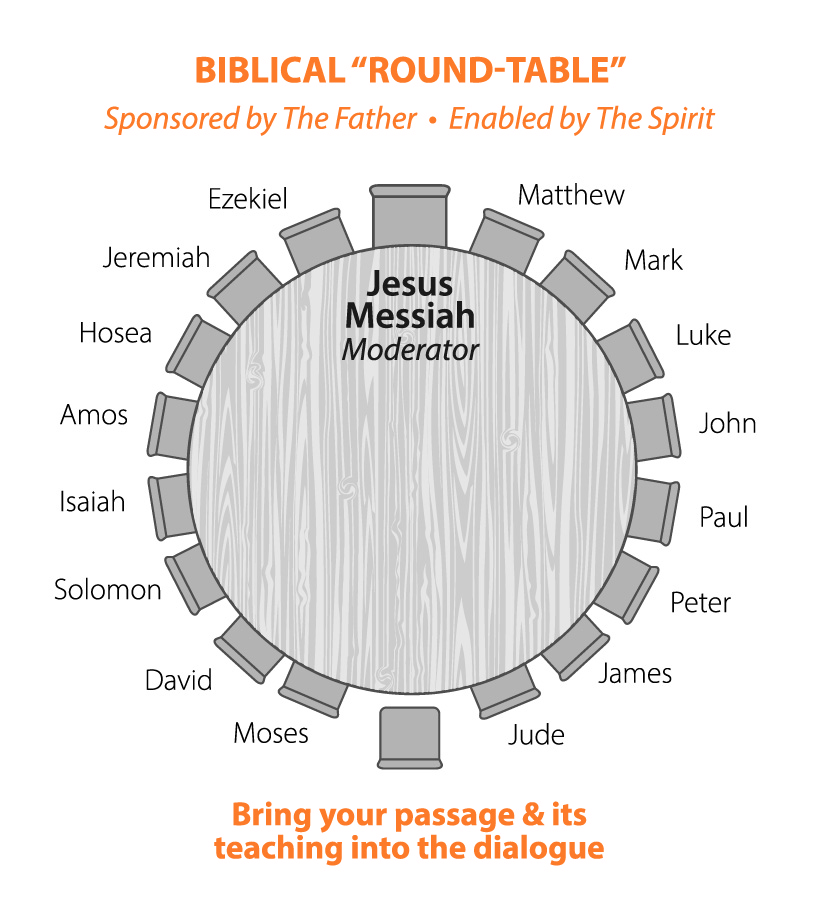
Let Jesus be the Guide. Below is a visual aid as I attempt to describe to you the importance of this initial step of Application. It is often called Evaluation. It’s where we have a round-table discussion with all the other writers of Scripture regarding a similar biblical topic. So, imagine sitting around a table (maybe this is Jesus’ original Campfire chat) with people like Moses, David, Ezekiel, Luke, Paul, and John. Some are contributing to the conversation while others are silent.
For example, if you worked on Mark 1, who around the table might speak on the topics of the wilderness? (Moses for sure would speak up!) What about the words spoken over Jesus by the Father at His Baptism? (Ahh, Isaiah would quickly raise his hand to speak). Or what about the topic of temptation. (Yes, the theme of temptation/testing in the wilderness is another topic Moses would contribute to). Where else in scripture, both Old and New Testament, do these biblical topics arise with regularity?
In Mark 8, what role does the naming of John the Baptist, Elijah, or “one of the Prophets” play in the question-answer of Jesus to the disciples? What about the designation “Christ” chosen by Peter? Does that have a scriptural background from the Old Testament?
If you worked on Mark 15, what Psalm is brought front and center in Jesus’ death? (Psalm 22 is referenced numerous times in Mark 15). Where else in Scripture does the theme of darkness play an important role?

Here is the hard part. To properly begin this first step of Application, you need to be aware of the whole Canon of Scripture; both the Old and New Testament. Ready to ramp this up? As you are listening to the Round-Table discussion, you need to find a way to put these biblical texts (or let's call them the voices of Moses and the prophets) into the mouths of the OT writers (and the NT writers confirming the Jesus-event). How might they contribute to the conversation?
Here is an affirming word. You have already begun the process. Remember your Interpretation work, as you read with the “Community of Faith?” One of the areas I asked you to focus upon was to hear these scholars discuss the topic “Echoes of Scripture.” Review your notes and think through these questions,
- How do the OT voices help prepare us for the teachings in Mark 1, 8, 15? Are these prophetic words now fulfilled in Jesus? If so, how?
- Are the NT voices in complete agreement with the OT? Does the story of Jesus as told by Mark (or John or Paul) alter our understanding of the in-breaking Kingdom of God? If so, specifically in what ways?
- Directly related to question #2 is this additional one. If there is not complete agreement on the meaning of a topic, is this because the NT has called us to recalibrate our Spiritual compass based upon the voice of Jesus? A more technical way of putting this question: What issues were raised in your interpretation that are not for all times and for all cultures? For example, the chapter on Application (chapter 10) in True^North discusses the topic of Jewish food laws? Are they for all people in every setting at all times?
Now, if you did not invest much time in that area of Interpretation, now is the time to regain your footing. Go back and check the three resources you used. As you scan these sources, you will quickly see that Mark is not the only voice at the Round-table. Many other biblical writers speak truth regarding the same topic. Now, if I was going to suggest two commentaries, it would be the two below. Their format is designed not only to focus on Interpretation (What the text meant) but also Application (What the text means to us).
- Garland, David E. 1996. Mark. The NIV Application Commentary. Grand Rapids, MI: Zondervan. https://thedtl.on.worldcat.org/oclc/973198622
Direct link in EBSCO
- Gombis, Timothy G, and Scot McKnight. 2021. Mark. The Story of God Bible Commentary Series. Grand Rapids: HarperCollins Christian Publishing. https://thedtl.on.worldcat.org/oclc/1259321183
Direct link in ProQuest
Now is the time to integrate this first step in Application with your Interpretation “final answer.” Can your refer to your notes uncovered during your Interpretation and address the three questions above. You may nuance them a bit as you ponder these equally relevant questions, “How has this effort helped you situate your passage in the larger context of the whole Bible?” Or How has the rest of the Bible helped grasp your understanding of your passage?
Just for fun, here is my grading rubric for both this part of the Application process as well as the next one for the Final Application work.